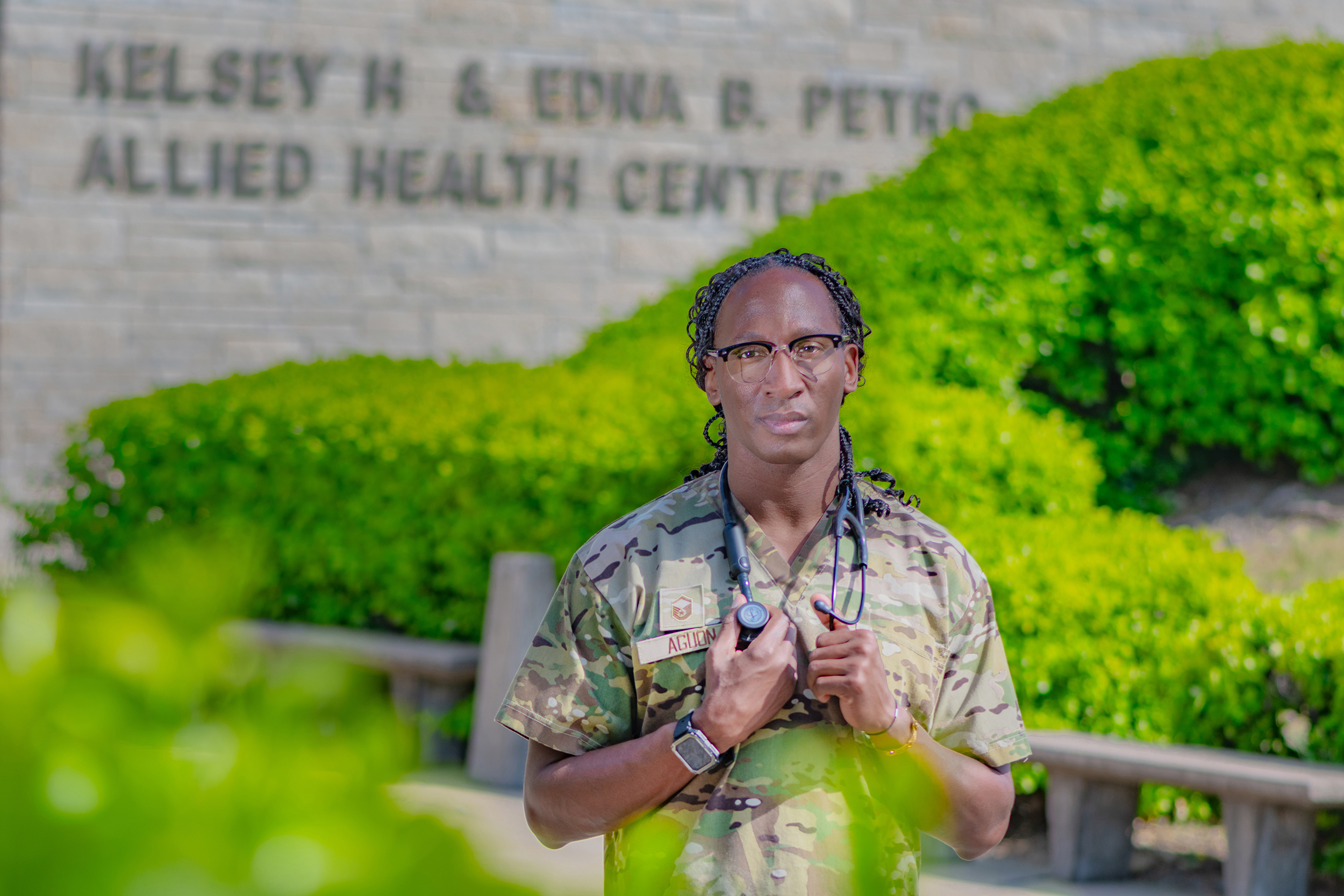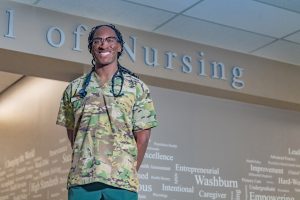
Master Sgt. Dean Michael Aguon is an Air Force medic and will earn a nursing degree from Washburn this spring.
From The Ichabod – Spring 2025
Story Angela Jonas • Photos Jeremy Wangler
During his time as a medic in the Air Force, Master Sgt. Dean Michael Aguon learned lots of valuable skills – how to think critically, conduct triage and lead large groups of people, to name a few. While stationed everywhere from California and Hawaii to Iraq and Afghanistan, he found providing care for vulnerable, medically underserved individuals was the most rewarding part of his work.
A new initiative in Kansas will help service members like him more easily apply those skills toward nursing degrees at schools like Washburn.
“I am proud to be a positive ambassador for the United States,” Aguon said. “The military provides healthcare to locals. Sometimes if it weren’t for us they might not have had access to basic care, or they wouldn’t receive emergency services. I think we as human beings have a duty to use our voice for good, and something I’ve tried to do in my military career is assist others when they aren’t able to help themselves.”
Several years ago, Aguon learned about the Nursing Enlisted Commissioning Program, an Air Force program that allows active-duty airmen to earn a nursing degree and become commissioned officers while remaining on active duty and receiving full pay and benefits. Aguon became the only senior enlisted member selected for the program in 2023. This led him to pursue a bachelor’s degree at Washburn University Harmony J. Hines School of Nursing while simultaneously working toward his doctor of nursing practice. He already holds a doctorate in public policy and administration, with research concentrating on social determinants of health.
“I was drawn to Washburn due to its strong commitment to community health, academic excellence and support for students like me,” Aguon said. “This institution offers an environment where I can grow as both a nurse and a scholar dedicated to improving care for underserved populations.”
Ultimately, he hopes his education will allow him to serve as a family nurse practitioner and continue to be a transformational leader both in the military and as a civilian. He’s had good practice: originally from Guam, Aguon has traveled around the world during his military career, most recently to Offutt Air Force Base in Nebraska, where he served as multispecialty flight chief and led a team of 57 personnel, supporting over 90,000 patient visits annually.
“In the military we must not only be good medics, but we must also be good leaders,” Aguon said. “We don’t have the ability to just do one job – I’ve also been a first sergeant, law enforcement officer, inspector general and senior enlisted leader. This makes medics good candidates to be nurses. Overall, my goal is to continue to lead at a higher level and become a healthcare provider. As enlisted people see one of their own rise, it gives them the motivation to rise as well.”
For medics like Aguon from all branches of the military, Washburn offers additional incentives to encourage enrollment, such as lower tuition and course offerings that recognize the robust training they already received in the military. Spearheaded by the Kansas Board of Regents, the Kansas Military Nursing Initiative brought nursing programs from Kansas together to compare military and state nursing curricula, understand the gaps that existed and determine what academic credit could be given for experience as a medic.
As a result of this collaboration, Washburn offers Nursing for Military Healthcare Personnel, a course which covers content that was not in the military curriculum. According to Lara Rivera, associate professor, this includes how to care for individuals throughout their lifespan as opposed to only in emergent situations. Military students also receive 10 hours of college credit and are not required to take nursing fundamentals courses that cover topics they’ve already learned. This aims to entice more medics to pursue healthcare careers.

“The program and the option for them to take this course recognize the experience they gained in their military training,” said Rivera, who teaches the military nursing course. “It helps facilitate a career transition. It allows them to secure a job where they will have stability and nice benefits, and it also rewards the time they’ve already spent learning some skills.”
This spring, the School of Nursing will graduate its second cohort of such military students, with the first having graduated in 2020. Rivera said Washburn is an excellent choice for military students because the school is so supportive of veterans. Along with several other nursing faculty members, Rivera has 20 years of military experience, which helps her understand and relate to her students. She underscores the tremendous value military students bring to Washburn and their peers.
“This program gives medics the opportunity to get credit for what they’ve already learned, and there’s a nice foundation laid of support for military personnel on campus,” Rivera said. “These students are amazing leaders. If you’ve been an officer and managed large groups of people, you have incredible leadership skills. They are also very dedicated to excellence – they are ready to work hard and they want to be the best at what they’re doing.”
1700 SW College Ave., Topeka, KS 66621
785.670.4483
contactus@wualumni.org
Copyrights © 2025 Washburn University Alumni Association and Foundation. All rights reserved. Privacy Policy